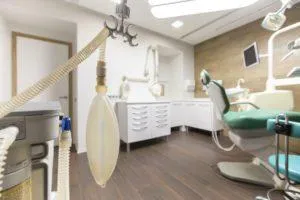Read All About It
Dental Related Articles


Hospital Dentistry for Pediatric Patients
What is hospital dentistry?
Hospital dentistry is when dental services are performed in a hospital setting due to a patient’s situation. This can be due to extreme anxiety, disabilities, or certain medical disorders.
The most common reason children need to go to the hospital for dental treatment is the severity of their dental caries. If a child has advanced tooth decay and cannot cooperate in the dental office, hospital dentistry may be the safest option.
Hospital dentistry is characterized by the use of anesthesia to calm patients or put them to sleep for a short time in order for dentists to fix the problem. With general anesthesia, patients are put to sleep and cannot feel the pain of the procedure. This makes it perfect for children who may have extreme dental anxiety.

The time has come for your child’s dental appointment. They have a few cavities to be filled. However, things are not going well.
All the way there, your child is screaming and crying, scared to death of going to the dentist. Even though you assure them that dentists are nice people who are going to help, they just keep screaming.
As you arrive at the office, your child refuses to leave the car. You have to pick them up and drag them inside. Your child absolutely refuses to go to the back without you, so you follow the dentist to one of the rooms. Your child is clinging to your hand and although they have stopped screaming, their eyes are filled with fear.
You manage to get them to sit on the chair, but when the dentist starts to lower it, they get scared and start to cry again. The dentist and assistant are doing everything they can to calm the child, but nothing seems to be working. As the dentist approaches with tools, your child jerks away and shouts, “No!”
The dentist assures the child that this is not going to hurt, and tries once again to get the child to cooperate. Instead, they jerk their head away again and try to get up. You squeeze their hand and try to comfort them, but they just want to get away. The dentist puts down the tools and turns to face you.
“I don’t think we will be able to work on your child today. I’m concerned about their safety. Come with me,” says the dentist.
You take your child’s hand and the two of you follow the dentist out to the front desk. The dentist reaches under the counter and hands you a pamphlet for a local hospital.
“Have you ever heard of hospital dentistry?”
When Is Hospital Dentistry the Right Choice for My Child?
Sometimes, hospital dentistry isn’t just a good option — it’s the safest and most comfortable one for your child.
Your child’s dentist may recommend hospital care if they:
Have severe dental anxiety that prevents safe treatment in-office
Need extensive dental work or multiple procedures in one visit
Have special health care needs or developmental differences
Are too young to understand or cooperate during treatment
In a hospital setting, your child is cared for by a team of pediatric specialists and anesthesiologists who focus on children’s safety and comfort. Parents can rest assured that everything is done under hospital-grade monitoring and standards.
Are there age limitations for hospital dental treatment?
No. All ages can go to the hospital for dental treatment, including children. Adults and children usually go to the hospital for dental treatment when they have a dental emergency. Of course, there are other reasons as well, such as a disability or extreme anxiety of the dental office.
Who should recommend hospital dentistry?
The best person to talk to regarding if your child needs hospital dentistry or not is their dentist. Of course, it does all come down to your decision and your child’s needs.
Usually, dentists will recommend oral sedation in-office for anxious patients. However, if the situation calls for it, general anesthesia in a hospital setting may be a better option.
What factors determine if dental treatment in the hospital is needed?
Your child may be recommended for hospital dentistry if they experience any of the following:
Advanced dental issues
Physical disabilities
Mental disorders
Severe dental anxiety
Uncooperative behavior
Certain medical disorders
As mentioned earlier, the most common reason children are recommended for hospital dentistry is because of severe childhood caries. However, this is not the only reason.
Children with disabilities or special needs may also be recommended for hospital dentistry if they are physically or mentally unable to work with dentists in an office setting.
Severe dental anxiety can be hard to deal with and the patient may not feel comfortable being awake during the procedure. In these cases, hospital dentistry may be recommended.
Uncooperative children can make it hard for dentists to do their jobs. If a child is jerking and screaming in the chair, it makes it dangerous to work on them. To avoid accidental injury, it may be recommended that uncooperative patients get general anesthesia in a hospital setting.
Patients with certain medical disorders may need to be in a hospital setting for their dental procedures.
Is Hospital Dentistry Safe for Kids?
This is one of the most common questions we hear from parents — and it’s an important one!
The short answer is: yes. Pediatric dental anesthesia is very safe when performed by trained specialists in a hospital setting.
At Hurst Pediatric Dentistry, Dr. Joby Hurst partners with Children’s of Alabama to ensure each procedure follows the American Academy of Pediatric Dentistry (AAPD) and American Academy of Pediatrics (AAP) guidelines.
During the procedure, your child’s heart rate, oxygen levels, and breathing are closely monitored by qualified hospital staff. These safeguards help your child stay safe, comfortable, and pain-free while receiving the care they need.
Are there any side effects to be aware of?
With general anesthesia, there is always the risk of complications. In most cases, however, it is perfectly safe. Some side effects can occur after general anesthesia has been given.

The side effects of anesthesia can include:
Cough
Sore throat
Dry mouth
Dizziness
Fatigue
Irritability
Nausea
Vomiting
Confusion
Muscle aches
Serious but rare side effects of anesthesia can include:
Allergic reaction
Brain injury
Cardiac arrest
Healthline describes the side effects of general anesthesia in more detail.
How to Prepare Your Child for a Hospital Dental Visit
Preparation is key to helping your child feel calm and confident before their hospital appointment. Here are a few helpful tips:
Talk about the visit in positive terms. Let your child know they’ll be “taking a nap while the dentist fixes their smile.”
Practice deep breathing or bring their favorite comfort item (like a stuffed animal or blanket).
Explain that you’ll be nearby and that doctors and nurses will keep them safe the whole time.
On a practical note, remember to follow all fasting and medication instructions from your anesthesiologist or dental team. These steps keep your child’s body ready and safe for anesthesia.
Are there any special preparations my child needs to make?
Preparing your child for hospital dentistry is very important. This can be done by role-playing or by reading children’s books on the subject. Even simply talking to your child and explaining what is going to happen can help them understand the situation better.
Other preparations are physical ones. These may vary depending on the situation or your child’s age.
If your child’s procedure requires general anesthesia, there are some rules to follow before and after the procedure.
Before
According to Children’s Hospital of Pittsburgh, eating and drinking guidelines will need to be followed a day preceding your child’s treatment.
For up to 6 hours before the arrival time, infants under 12 months can be given formula, and for up to 4 hours before the arrival time, they may nurse.
Children must not eat anything solid or drink any non-clear liquids after midnight the night before the procedure.
For up to 2 hours before the procedure, children may have clear liquids only. This includes water, Pedialyte, Kool-Aid, and any juices that you can see through. Milk is not a clear liquid.
Children may take any daily medication prescribed to them unless told not to by the doctor or scheduling nurse.
After
After the procedure has been completed, your child’s vital signs will be checked in the recovery room. The effects of anesthesia can last for hours after.
Your child may experience numbness in the mouth and throat for 30 to 45 minutes. They may experience a sore throat, gums, and/or mouth for a few days depending on what procedure was done and they may also have dizziness or vomiting.
For the first 30 to 40 minutes after your child wakes up, watch them carefully while they eat or drink. Only give soft foods for the first few hours after the procedure.
When it is time to go home, take it easy. Your child will most likely be feeling tired and should spend their time resting. They should not be sent to school or daycare for the rest of the day.

What to Expect After Hospital Dental Treatment
After your child’s dental procedure, they’ll spend time in a recovery area where nurses monitor them until they’re fully awake.
Most children feel sleepy for a few hours afterward. Mild side effects — like a sore throat or slight dizziness — are normal and temporary.
Encourage rest, offer soft foods like yogurt or applesauce, and give extra cuddles. Within a day or two, most kids are back to their bright, energetic selves!
Learn More
If your child struggles to get through appointments at the dentist’s office, hospital dentistry could be your best option. Children who have special needs, medical conditions, or anxiety may feel more comfortable undergoing their treatment with general anesthesia.
Dr. Joby Hurst has received specialized training in pediatric hospital dentistry. He utilizes these skills at the Children’s Hospital of Alabama, where he has earned privileges to practice.
Visit our contact us page or call us at (205) 969-7454 for more information.

19 INVERNESS CENTER PARKWAY, STE 250, BIRMINGHAM, AL 35242
TEL: 205.969.7454
E-MAIL: [email protected]
2018 © ALL RIGHTS RESERVED | PRIVACY POLICY | TERMS AND CONDITIONS
Site by Trustway Marketing Powered by Kyrios Systems